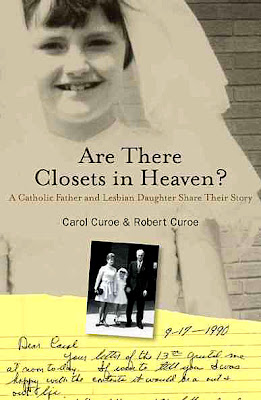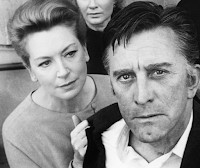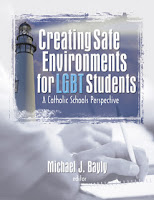An interview with Carol Curoe, co-author of
Are There Closets in Heaven?
A Catholic Father and Lesbian Daughter
Share Their Story
Carol Curoe is a business consultant in Minneapolis, where she lives with her partner of twenty years, their sons, Patrick and Jonathan, and the family dog, Max. When she came out to her parents in 1990, their response was one of shock. They were from a small, conservative, Irish Catholic farming community in eastern Iowa, and were totally unprepared to deal with their daughter’s “coming out” as a lesbian.
Yet Carol and her father Bob were determined to keep the lines of communications open. What followed over the next several years was a steady stream of correspondence, both poignant and liberating in its honesty and candor. Many of these letters comprise Carol and Bob’s book, Are There Closets in Heaven? A Catholic Father and Lesbian Daughter Share Their Story, published earlier this month by Syren Book Company. On October 22, Carol and Bob will be the keynote speakers at CPCSM’s Second Annual Bill Kummer Forum.
(NOTE: This interview was first published in the Fall 2007 issue of the Rainbow Spirit, the journal of the Catholic Pastoral Committee on Sexual Minorities (CPCSM).
___________________________
Michael Bayly: Your book documents the journey of both yourself and your father in relation to your coming out as a lesbian. Because it’s such a personal story, some may be wondering what compelled you to share it in such a public way. What do you hope to achieve from the publication of your book?
Carol Curoe: When we first started writing the book, I had two reasons for the project. First, and probably foremost, I wanted to acknowledge my parents and the incredible progress they have demonstrated on their journey. As you can tell in the book, I am quite proud of both of my parents and feel so fortunate to have them as role models in my life. How they coped with my coming out, even in the very beginning before they sorted out their initial reactions, was always respectful and caring. It’s one of many examples they gave my siblings and me on how to deal with challenges life throws at you.
Secondly, my partner Susan and I had just ended a successful real estate business partnership with my parents, and I wanted to replace that interaction with another project. Both Susan and I greatly enjoyed the years of being in business with my parents; we learned a lot from them and the business created many opportunities for us to spend time together. I knew we would miss that interaction.
Now that we have actually written the book, and have heard the positive impact it has on readers, we have broader aspirations. We hope that by telling our story, other families and friends of gays and lesbians, as well as GLBT individuals, will also tell their stories. I believe people learn through stories and as is the case with all human rights issues, learning and education are at the heart of the issue.
For me, personally, weaving in the impact of being Catholic into the story was not a high priority. For Dad, however, this was a very significant part of his story. Again, now that we have published the book, we see how incredibly timely the story is for members of the Catholic Church as well.
 Carol Curoe and her father Robert.
Carol Curoe and her father Robert.
Michael Bayly: What was the most difficult part about writing Are There Closets in Heaven? Were there some aspects of the process that were easier than others?
Carol Curoe: The most difficult part of the process was actually making time for it. Both Dad and I were very busy with other aspects of our lives, and without an actual deadline it was hard to make progress on it.
In 2006 both of my parents had major heart surgeries, so my 2007 New Year’s resolution was to get the book published this year. We had enough of our time invested already; I wanted to make sure it was published while Mom and Dad were alive. I didn’t quite meet that goal entirely.
Mom died right as the galley books were being printed, May 22, 2007. However, she was part of all the meetings with the publisher up to that, and she participated fully in selecting a title, designing the cover and page layout as well as the editing. I know she’s watching it all play out from the best seat in the house!
Michael Bayly: Can you talk about your relationship with the Roman Catholic Church. Has it changed?
Carol Curoe: The journey has been interesting. As I mentioned earlier, the Catholic Church was not originally a major focus for me in writing this book. I had reconciled with myself that Susan and I belonged to St. Joan of Arc parish, an open and affirming parish. I tried hard to ignore the fact that SJA was part of the larger Catholic Church which is NOT open and affirming.
Dad arranged for us to have breakfast with Bishop Gumbleton when he was in Minneapolis speaking. Susan and I agreed to go, but honestly, had low expectations. After all, he was one of those straight, white males who ran this huge organization that did not fully welcome my family. That breakfast had a profound impact on all of us. Meeting Bishop Gumbleton put a “real face” on the Catholic Church and opened my eyes to the challenges faced by those inside the Church. Prior to this, I had selfishly only seen the impact the Church’s position on homosexuality had on me and my family. I was inspired by the passion (and compassion) he felt for helping the Church move forward.
This book has connected us with many individuals and groups that are working to bring the Church together on the issue of accepting ALL its members. I’m not clear yet on how my relationship with the Church has changed, but I do know it is changing.
Michael Bayly: What role, if any, do you think stories such as yours and your Dad’s can play in the Church’s formulation of its understanding and teaching on human sexuality?
Carol Curoe: I hope our story can help others recognize that this issue isn’t just about the gays and lesbians trying to stay in the Church. It’s about considering the impact that policies and teachings have on family members and their friends who may view Church teachings as asking them to choose between their love of Church and their love of their son, daughter, or friend.
Michael Bayly: Given the official Church’s stance on gay people and issues, why do you continue to identify as Catholic?
Carol Curoe: For me it is more about being part of a spiritual community that knows God as a loving God and inspires me to be a better person than it is about identifying with a specific denomination. For now, we happen to have found that at St. Joan of Arc which is a Catholic Church.
Michael Bayly: Your book’s title is actually a question: “Are There Closets in Heaven?” How did you come up with this title and what’s your answer to the question it poses?
Carol Curoe: Choosing a title was much harder than I would have expected. I have a spreadsheet with probably 50-60 variations of possible titles, but none of them worked for all four of us (Mom, Dad, Susan, and me). Finally, we were coming down to the wire. The publisher needed a title by Monday and it was already Saturday. I started playing around with all the various combinations of words, and this one came out. It was kind of like those refrigerator magnets with words that you arrange into sentences.
I probably have to be careful on how I answer the second part of your question. It seems so obvious to me; but that’s exactly the kind of attitude that gets all of us in trouble. With that said, however, I have to believe that there are NOT closets in heaven. Closed-in spaces, special rooms, or designated areas are not part of what I envision as God’s kingdom. Given that, I think the real question is, “Then why are there closets here?”
Carol and Bob will be the keynote speakers at CPCSM’s Second Annual Bill Kummer Forum on October 22, 2007.
_______________________
Note: This event was originally planned to be held at St. Frances Cabrini Church, yet after receiving a number of phone calls and e-mails from Catholics opposed to Carol and Robert speaking on Catholic property, the Archdiocese of St. Paul/Minneapolis informed St. Frances Cabrini that the Curoes could not speak there.
Their October 22 presentation will now take place at The House of the Beloved Disciple (2930 13th Ave. S., Minneapolis).
For the joint media release from CPCSM and Syren Book Company about the banning of the Curoes, click here.
10/26/07 Update: For images and a commentary on Carol and Robert Curoe’s October 22 presentation at The House of the Beloved Disciple, click here.














































